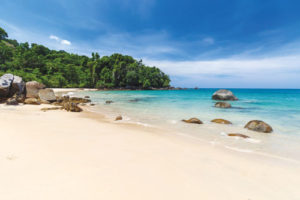With the growing international connectivity into southern Thailand, European visitors are seeking out lesser-known beach destinations and booking later than ever before.
With the growing international connectivity into southern Thailand, European visitors are seeking out lesser-known beach destinations and booking later than ever before.
 The last-minute booking trend among European tourists into Phuket is becoming more apparent than ever before, in part driven by international carriers’ aggressive expansion into southern Thailand in recent years which have led to competitive pricing and greater flexibility in holiday planning for longhaul travellers.
The last-minute booking trend among European tourists into Phuket is becoming more apparent than ever before, in part driven by international carriers’ aggressive expansion into southern Thailand in recent years which have led to competitive pricing and greater flexibility in holiday planning for longhaul travellers.
“Four to five years back, if you don’t have your Thailand winter holiday booked by October, you wouldn’t be able to get flights or hotels,” said Tobias Fischer, business development director at Go Vacation Thailand, observing shorter booking lead times among the European market. “That’s not the case anymore.”
It’s a situation that DMCs are becoming more accustomed to, and Destination Asia’s Thailand general manager, Philip Wigglesworth, said: “Inbound booking patterns from Northern Europe have changed somewhat over the years as travellers become more at ease with booking holidays with shorter lead, sometimes up to six weeks or less. They are familiar with the destination and younger FIT couples prefer flexibility and are not keen to lock themselves into long-lead bookings.”
Lisa Fitzell, group managing director, Diethelm Travel Group, further notes an increase in the “pure beach segment customer”, which she discerns is a different clientele from the traditional European customer who combines a Thai beach vacation with other destinations.
“The beach holiday client just wants good value, sun and sea, so (Thailand’s) competing with destinations such as Cuba or Mexico. Full-board options are on the rise from our European customers.
“The arrival of the direct flights into Krabi and Phuket mean we need to offer more competitive and meal-inclusive deals to compete within the worldwide beach segment,” added Fitzell.
With better direct connectivity into Phuket from longhaul markets, secondary beach destinations in southern Thailand are now picking up as favoured holiday spots for European visitors.
Destinations like Krabi, Trang, Koh Lanta and Khao Lak no longer have to “suffer in Phuket’s shadow”, Fischer remarked. “We’re seeing more roomnights booked by the German-speaking markets in Khao Lak than Phuket.”
He added: “More than 60 per cent of repeat travellers look to new destinations and it doesn’t help that the influx of charter markets flooding Phuket right now are pushing the Europeans out of the island.”
The direct connectivity is also driving the surge of “twin-centre breaks” in southern Thailand, where Phuket is paired with Koh Yao Noi, Krabi with Koh Lanta, and Khao Lak with Khao Sok, Wigglesworth told TTG Asia.
Bill Barnett, founder and managing director of C9 Hotelworks, isn’t surprised with the destination shifts among the European visitors. “The legacy European market is very much alive. These ‘snowbirds’ from Scandinavia, the UK, Germany, Austria, etc, are long-stayers so they have migrated to less expensive destinations like Khao Lak, Krabi and Koh Lanta.”
As well, issues such as a pricier Phuket, the island’s sun lounger ban imposed by the Thai government and Krabi’s easier access with growing charter airlift are some of the factors that have pushed Europeans to other southern Thai destinations, he observed.
But Barnett’s not quick to write off the legacy markets for Phuket yet. “The world changed after the global financial crisis and Asia markets have become more prolific as the ‘East is now new West’, so it’s not that drastic as Phuket’s European markets remain strong while other segments have outpaced them.”
Sharing similar sentiments, Anthony Lark, president, Phuket Hotels Association, commented: “Phuket is changing, as are the world travellers… Asia and Russia are becoming more prolific (source markets) than in the past, yet the legacy markets from Northern Europe and Scandinavia remain firmly intact as Phuket is an important destination for these markets.”
This article was first published in TTG Asia April 2017 issue. To read more, please view our digital edition or click here to subscribe.




















